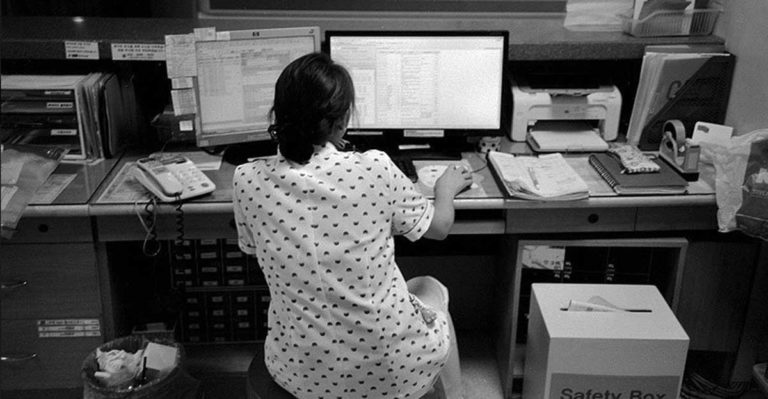In December of 2008, I remember watching the pinning ceremony for the nursing class graduating half a year before me. I attended Washington State University’s Nursing School in Spokane, and we turned out about 100 new nurses every half year. As part of the ceremony, it was tradition to say where each graduating nurse had a job lined up.
The pinning ceremonies are always fun, if for no other reason to see where people will be working. I recall counting, on one hand, how many people still hadn’t lined up a job. Not to worry, we thought, all we’ve heard for the last seven years was how short the industry was of nurses. Those five new grads were sure to get jobs.
Fast forward six months: I am the one on stage receiving my pin. In that period between the last graduating class and mine, a little thing called “The Great Recession” hit like a sledgehammer. Hospitals still needed nurses, but they couldn’t afford them, especially new grads who sometimes required six months of training before they could take their assignment.

While experienced nurses were more expensive on an hourly basis, training periods for new nurses eat away at hospital budgets. Employers began requiring a minimum of six months of experience before granting an interview. The result for my graduating class was a complete reversal from the previous one: instead of only five nurses without jobs, only five had jobs lined up.
The economy has dramatically improved since then, but we still haven’t gotten back to the glory days where jobs were aplenty. After holding five different nursing positions over the last decade, I learned quite a bit about job hunting in the nursing field. Here are a few tips I typically share when asked for advice.
#1: Work All Connections:
An unfortunate and unfair reality of getting nurse jobs is that connections really do help.
Whether you know it or not, you probably have a connection to someone at the hospital where you want to work. Heck, if I’m only six connections away from Kevin Bacon, then you can probably find someone to help you out. Those people can vouch for you and get your name placed on the pile for their manager to interview. Post on social media, ask your family if they know anyone, and follow-up with them as often as you needed to get an interview or email address.
#2: Expand Your Targets:
After graduating in 2009, I hit the hospital websites and entered into the abyss that is the hospital application process. After four months, I had sent out hundreds of applications, only to receive automatic rejections from their computer screening mechanism.
Essentially, Siri or Alexa found out I had no experience and declined to pass my information on to the hiring Manager. It is beyond frustrating for new grads. “How am I supposed to get experience if no one will hire me?!” is a phrase I’ve heard numerous times and screamed at my computer more than I’d like to admit.
Ultimately, I had to widen my target list and began applying to departments I wasn’t initially interested in, cities I hadn’t planned on living in, and in the end took a job at a Skilled Nursing Facility.
I can hear some of you wincing, but let me tell you, it is HARD WORK. You want to get good at time management, learn the responsibility of giving meds without oversight, sit with patients during their last moments, work as a team with CNAs, and make a salary? There are worse options than that out there. Expand your targets to get that experience while you continue to apply for more ideal jobs.
#3: Be Persistent
You’ve worked hard to get your nursing license, so it only makes sense that you’d have to work hard to get that first job. When you get that automated rejection email, don’t stop there.
Try calling the nurse recruiters for the hospital and share with them your story, connect with them and make them remember you.
Recruiters know which departments have positions that are waiting to be approved, and they can direct you to the manager on site. They won’t always give out the Manager’s email or phone number, but if they like you and empathize with you, then you might luck out!
Whether you are sending out 200 applications or digging for email addresses and phone numbers, be persistent, and you’ll increase your chance of landing a job.
#4: Try Different Platforms
There’s more than one way to get a job. Applying on a hospital website is like a marathon sport with several pages to click through, questions to answer, and files to upload – when most of the information can be found on your resume. It feels like it’s the same platform people use to apply for the FBI.
Pro-tip: Your best resources are recruiters on LinkedIn, who know a variety of job opportunities (mostly travel assignments), sites like Nurses.com, and apps like Nursegrid that help you skip some of the hoops that you are usually required to jump through.
At Nursegrid, we made the process as simple as possible, so applying takes a single tap and saves you hours of time.
When I was in high school, I remember being recruited to be a nurse because “the demand is so high you’ll never have a problem finding a job.” Even though that isn’t true, we still have an extremely useful degree and remain in a favorable market, regardless of hospital hiring budgets. The most important point is don’t give up. Whether you are a new nurse, looking for your first job, or an experienced night nurse, looking for a day shift position, your talents are valuable and needed; it’s just a matter of maneuvering your way through the system to land you the best job possible for your career.
